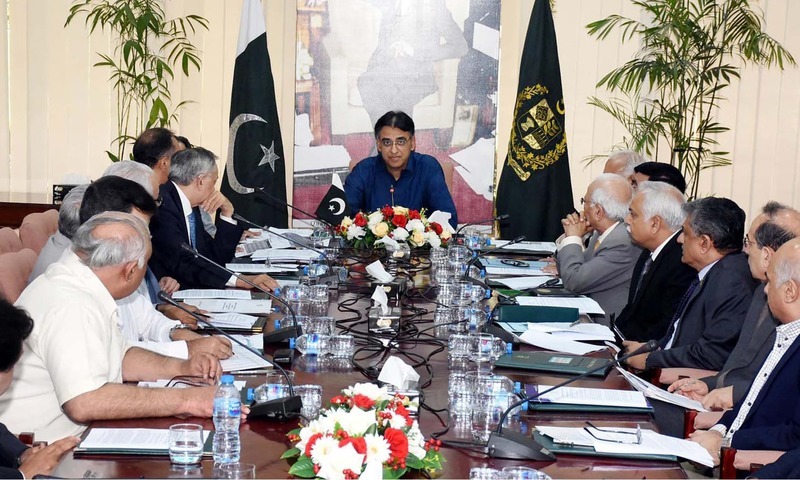ISLAMABAD: The Economic Coordination Committee (ECC) of the Cabinet on Tuesday amended the natural gas load management policy for winter shortages to upgrade five zero-rated export sectors on the priority list after domestic and commercial consumers.
The meeting of the ECC was presided over Minister for Finance Asad Umar that deferred a proposed increase in electricity rates for the eighth time since the PTI came to power around two months ago.
Under the decision, zero-rated export sectors – textile including jute, carpets, leather, sports and surgical goods – would be treated on a par with the power sector in gas supplies instead of the third position under load management policy of 2013. They would be given a blend of domestic gas and imported LNG on a 50:50 basis at an weighted average cost of about Rs870 ($6.5) per unit.
ECC defers electricity tariff hike for eighth time
This practically restores the 2005 load management policy when industry and power sector used to be on second priority. The domestic and commercial consumers have always been top priority in supply of gas in winter shortage and would remain unchanged.
The decision was taken in follow up of Mr Umar’s supplementary budget speech in which he promised around Rs44 billion subsidy to five export sectors in Punjab to help them stand on their feet after years of sufferings due to increased cost of production, resultantly eroding their export competitiveness and closure of tens of thousands of industrial units mostly in the industrial hub of Faisalabad.
A cabinet member who attended the meeting, however, told Dawn that the average cost of revised gas supply arrangement was estimated at Rs63.34bn. This includes about Rs21.55bn for three winter months of December to February and Rs41.79bn for remaining nine months. The total burden on the budget would be about Rs40bn after excluding non-export industry.
He said the Sui Northern Gas Pipelines Ltd (SNGPL) faced about 211 million cubic feet per day (mmcfd) gas shortage in November, 314mmcfd in October, peaking to 520mmcfd in December and then 166mmcfd in January and 144mmcfd in February. This was because all governments including that of the PTI preferred residential and commercial consumers to run their stoves, geysers and heaters on natural gas instead of securing higher and cheaper industrial and power output.
This practically meant that industrial sector could secure only 28 per cent domestic gas with a sale price of Rs600 per million British Themal Unit (mmBtu) and met remaining 78pc requirement on RLNG having a cost of $12.54 (Rs1,680) per unit at present. The industry has a total gas requirement of about 300mmcfd in Punjab.
Now, the export sector would get entire gas supply at weighted average cost of $6.5 (about Rs870) per mmBtu.
Officials said it was not yet clear how the fiscal gap of Rs40-45bn would be met and how it would be paid to SNGPL which had 45-day payment cycle for domestic gas bill recovery. At the same time, it required upfront funds to pay off invoices to LNG importers – Pakistan State Oil and Pakistan LNG Ltd – on a 10-day basis for onward clearance of letters of credit to international LNG suppliers under sovereign guarantee.
According to the official, SNGPL does not have the financial capacity at present to meet these obligations at its own and could face default unless subsidy amounts are paid out of federal budget in advance on a weekly basis.
The export industries “would be supplied RLNG during the three winter months when the gas demand of domestic sector would be at its peak. During the remaining months (March-November), these industries would be supplied domestic gas and RLNG on a 50:50 basis,” an official statement said.
The gas price of similar consumers of Sui Southern Gas Company Limited (SSGCL) in Sindh and Balochistan and those of SNGPL in Khyber Pakhtunkhwa would remain unchanged because of constitutional commitments that guarantee fresh gas supplies to consumers with the areas of gas production.
LNG agreements discussed
The meeting was also given a briefing on the LNG terminals’ agreements signed during the previous government. The ECC decided that facts ascertained after discussion will be shared with the federal cabinet in its next meeting.
These industries were seeking a bailout in gas rates during the five years of PML-N since a lot of industry was shifted either to Sindh and Khyber Pakhtunkhwa or abroad — Bangladesh and Malaysia — but mostly in vain.
The government expects the decision coupled with similar benefits on electricity rates would substantially address a major challenge of the industrial sector in Punjab that is anticipated to revive 500,000 jobs
In his budget speech, the finance minister had said that the industry in Sindh was already getting cheaper gas while due to expensive 72pc imported LNG, the cost of production had gone up in Punjab, rendering 500,000 labourers jobless in Faisalabad.
Published in Dawn, October 17th, 2018















































